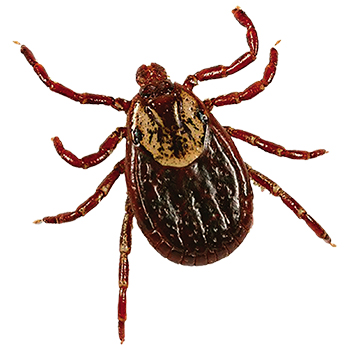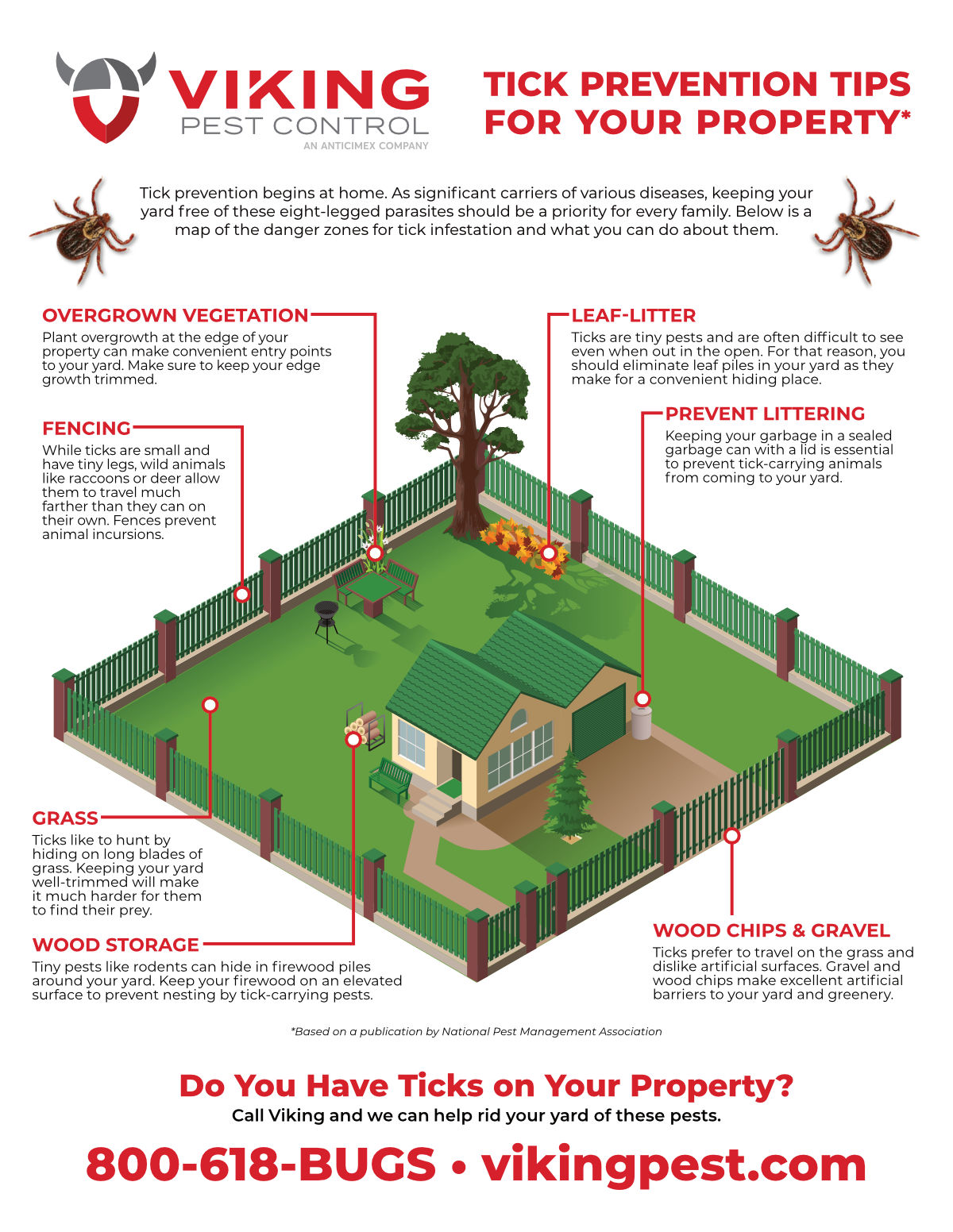Tick Extermination and Prevention

Ticks are tiny pests that can cause serious problems for pets and humans in New Jersey, Pennsylvania, Maryland, and Delaware. A tick can attach to your skin and start feeding off of your blood without you even noticing that it’s there. Tick control experts say the small size and behavior of ticks make it easy for them to find and attach to a host. Ticks are a threat to humans because they have the ability to spread serious diseases like Lyme disease and tularemia. This pest is known to live in wooded areas throughout New Jersey, Pennsylvania, Maryland, and Delaware. To protect your home or business from ticks, you need to learn about the behavior of this pest, take steps for prevention, and find effective treatment options should an infestation occur.
What Are Ticks?
Ticks are parasitic pests that latch onto your flesh and live off of your blood. Ticks attach by creating a wound on your skin and then insert a feeding tube into that wound. Once they latch on, ticks can stay attached to you for an extended period of time. The National Center for Biotechnology Information has a library of resources about ticks and points out that these pests can remain attached to your skin for up to two weeks. Once the tick is full, it’ll fall off of your skin on its own.
Exterminators explain ticks are dangerous pests because they have the ability to spread serious diseases to humans. The symptoms of these diseases can range from mild—irritated skin—to very serious symptoms such as high fever and swelling. The Centers for Disease Control and Prevention provides an exhaustive list of tick-borne diseases in the U.S. This list includes examples such as Lyme disease, Rocky Mountain spotted fever and tularemia.
How Do I Identify Ticks?
Ticks are arachnids. Some types of ticks have six legs in the early stages of development, but all ticks have eight legs when they reach adulthood. Ticks are flat, oval, and typically a shade of brown when they haven’t been feeding for long. Once ticks are engorged, they become larger, more round, and often appear to change colors. Pest World provides a breakdown of several species of ticks and points out that some, such as the Rocky Mountain wood tick and the Lone Star tick, turn gray when they become engorged.
Exterminators explain the behavior of ticks is unique when compared to many other types of pests. Ticks attach to your skin and you can’t remove them by simply brushing them away. Ticks anchor themselves to your flesh with the tube they insert to feed off of your blood. In order to completely remove the tick, you need to do so by using a technique that removes the entire body and the head. The CDC recommends using a pair of fine-tipped tweezers to remove a tick that’s attached to your skin.
If you find you have a tick attached to your skin, remove it as soon as possible. It’s important to take note of any symptoms that arise after you notice the tick. The CDC provides a list of symptoms to look out for after an encounter with a tick. Seek medical help if you have any concerns that you have contracted a tick-borne illness. Some places, such as the Maryland Department of Health, provide tick identification services if you want to know exactly what type of tick bit you.
You can get help identifying potential tick activity and habitats around your New Jersey, Pennsylvania, Maryland, or Delaware home or business from the tick control experts at Viking Pest. The pest control professionals at Viking Pest can also reduce tick populations with our mosquito and tick treatment, Last Bite.
How Do I Get Ticks?
Many types of ticks are found primarily in wooded areas around New Jersey, Pennsylvania, Maryland, and Delaware. You can get a tick on you by brushing up against a tree or other vegetation that’s infested with ticks. Ticks crawl around on you until they find an area of skin that’s suitable to their needs. Pest control experts explain a tick can also crawl up from the ground onto your shoes or clothing and eventually find its way to your skin.
What Are the Effects of Ticks In and Around My Home or Business?
Ticks around your home or place of business can cause serious problems for you, your family, your pets and customers. Ticks can spread serious diseases to humans including Lyme disease, Rocky Mountain spotted fever and tularemia. The Maryland Department of Health provides fact sheets on each of these tick-borne diseases to help you recognize the potential symptoms. Some tick bites are harmless but others can lead to symptoms that include skin irritation, headache, fever, abdominal pain, swelling, and neurological problems.
“People are rightly worried about Lyme disease,” says Craig S., Public Health Entomologist and Viking Pest Service Director. “In recent years, milder winters led to an increased distribution of diseases like chikungunya, Powassan, and Alpha-Gal (red meat allergy).”
How Long Do Ticks Live?
According to the Centers for Disease Control and Prevention, ticks can live up to three years. Ticks attach themselves to your skin and can feed for several days to two weeks at a time. Once full, these pests detach from your skin and start preparing for the next life stage and feeding. If ticks don’t find their next host after their last feeding, they may not survive the three years.
How Do I Prevent Ticks?
Tick prevention includes a combination of outdoor maintenance efforts, personal protection, and intervention or recommendations from a tick control expert. Ticks thrive in wooded areas. If you have overgrown vegetation near your house or business, cutting it back can help with tick control. Pest control experts recommend creating space between wooded areas and the places where your family or customers move about.
When you plan to spend time outdoors, you can take precautions against tick bites by using tick repellent spray or wearing tick repellent clothing. Viking Pest Control offers a service called Last Bite designed to protect your yard from ticks. This is a tick control that includes multiple visits to your home or business to look for and treat areas of your property where ticks live and breed. By getting to ticks at the source, Last Bite can provide effective tick extermination service.
How Do I Keep Ticks Off of My Kids and Pets?
- Avoid Tick-Prone Areas: Stay away from tall grass and wooded areas where ticks are commonly found. Check for tick sightings in the area before going on hikes or camping trips.
- Dress Appropriately: Wear long-sleeved shirts and pants to minimize exposed skin. Use tick-repellent sprays or oils on clothing to enhance protection.
- Keep Your Yard Tidy: Regularly maintain your yard by cleaning up debris like leaves and keeping grass trimmed. This reduces tick hiding spots and decreases the chances of tick encounters for both humans and pets.
- Check for Ticks: After outdoor activities, thoroughly check yourself, your children, and your pets for ticks. Promptly remove any ticks you find using proper techniques.
- Professional Tick Control: Consider hiring a professional tick control service to effectively manage tick populations on your property. They can use treatments or products designed to eliminate ticks and minimize the risk of tick-borne diseases.
Most ticks stick to wooded areas, but they may be present in tall grass, gardens, lawns, and brushy, overgrown areas. They usually remain on or near the ground waiting for an unsuspecting host and don’t typically climb or live in trees.
1. Grasp the tick close to the skin. Be sure to apply steady, even pressure without jerking or twisting, as squeezing too hard can force the tick to regurgitate into you and increase the risk of disease.
2. Gently pull the tick upward with the tweezers until it comes out.
3. Identify whether you’ve removed the entire tick or if the mouth remains embedded in the skin. If it’s still there, use the tweezers to remove it.
4. Thoroughly wash the bite wound with soap and water.
5. Monitor yourself for rashes or other flu-like symptoms for the next several weeks. These could be indicative of a disease spread by the tick bite and if they arise, they warrant a medical appointment.
Removing ticks from dogs follows the same steps as removing them from human hosts. However, you might need a second person to hold your pet still and keep its fur spread out during the removal process.
Ticks aren’t actually insects—they’re arachnids, which is why mature ones have eight legs (four pairs) instead of six. However, in their larval stage, they only have six legs.
Ticks typically seek out soft, warm areas to lay eggs. Outdoors, this is commonly in grass, soil and leaf litter near trails. However, if they get indoors, Brown Dog Ticks may opt to lay their eggs in carpet, soft furniture or coat linings.
Ticks must feed on blood to reproduce. Despite this, some species can survive an astonishingly long time without a host. Different species can survive different lengths of time without a host to feed from, but as a general rule, most species of ticks can usually live less than a year. American dog ticks are an exception, surviving up to two years without a host.
While most ticks can’t live indoor very long. The lack of humidity usually kills the tick through dehydration. The Brown Dog Tick, however, is an exception that can live indoors for far longer.
Many insect repellents work to deter ticks from latching onto people. These products typically include DEET, picaridin, permethrin and other repellents as an active ingredient.

















